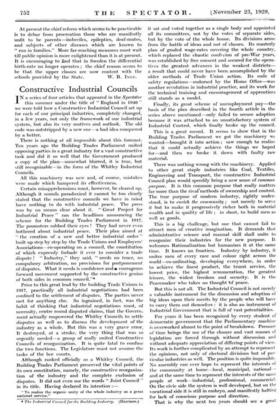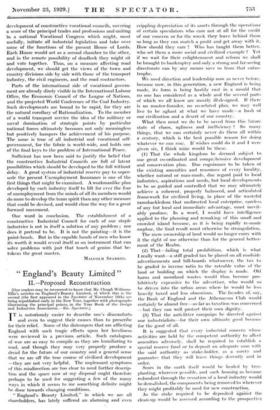Constructive Industrial Councils
IN a series of four articles that appeared in the Spectator this summer under the title of " England in 1940 we were told how a Constructive Industrial Council set up for each of our principal industries, completely changed, in a few years, not only the framework of our industrial system, but also its very motives and outlook. The old code was outstripped by a new one—a bad idea conquered by a better.
There is nothing at all impossible about this forecast. Ten years ago the Building Trades Parliament united opposing parties in a great industry for a vast constructive task and did it so well that the Government produced a copy of the plan—somewhat blurred, it is true, but still recognizable—in the form of the Whitley Industrial Councils.
All this machinery was new and, of course, mistakes were made which hampered its effectiveness.
Certain misapprehensions must, however, be cleared up. Although it sounds paradoxical it cannot be too clearly stated that the constructive councils we have in mind have nothing to do with industrial peace. The press was by no means clear about it. " Great Project for Industrial Peace " ran the headlines announcing the scheme for the Building Trades Parliament in 1917. The promoters rubbed their eyes ! They had never even bothered about industrial peace. Their plan aimed at " the creation of a new and better industrial order " built up step by step by the Trade Unions and Employers' Associations—co-operating on a council, the constitution of which expressly forbade it ever to consider a trade dispute ! " Industry," they said, " needs no truce, no compulsory arbitration, no provisions 'for postponement of disputes. What it needs is confidence ands courageous forward movement supported by the constructive genius of both sides in common council."* Prior to this great lead by the building Trade Unions in 1917, practically all industrial negotiations had been confined to the settlement of disputes. The parties never met for anything else. So ingrained, in fact, was the habit of thinking that industrial negotiations must, of necessity, centre round disputed claims, that the Govern- ment actually empowered 'the Whitley Councils to settle disputes as well as to discuss the development of the industry as a whole. But this was a very grave error. It destroyed, at a stroke, the very thing that was so urgently needed—a group of really united Constructive Councils of reorganization. It is quite fatal to confuse the two functions. The Legislature must not assume the tasks of the law courts.
Although ranked officially as a Whitley Council, the Building Trades Parliament preserved the vital points of its own constitution, namely, the constructive reorganiza- tion of the industry and the complete exclusion of disputes. It did not even use the words " Joint Council " in its title. Having declared its intention :- " To realize the organic unity of the whole industry as a great
national service."
• The Industrial Council for the Building Industry. (Harrison.) it sat and voted together as a single body and appointed all its committees, not by the votes of separate sides, but by the vote of the whole house. Its divisions arose from the battle of ideas and not of classes. Its masterly plan of graded wage-rates covering the whole country, which replaced the chaotic confv:ion of pre-War years, was established by free consent and secured for the opera- tives the greatest advances in the weakest districts— a result that could never have been accomplished by the older methods of Trade Union action. Its code of safety regulations—endorsed by the Home Office—was another revolution in industrial practice, and its work for the technical training and encouragement of apprentices still stands as a model.
Finally, its great scheme of unemployment pay—the basis of the plan described in the fourth article in the series above mentioned—only failed to secure adoption because it was attached to an unsatisfactory system of Industrial Control, which finally broke up the council.
This is a great record. It seems to show that in the Building Trades Parliament we got the machinery we wanted—brought it into action ; saw enough to realize that it could actually achieve the things we hoped for—and then we broke it down with faulty raw material.
There was nothing wrong with the machinery. Applied to other great staple industries like Coal, Textiles, Engineering and Transport, the constructive Industrial Council plan would speedily bring a new sense of common, purpose. It is this common purpose that really matters far more than the rivarmethods of ownership and control. The true purpose of modern industry, rightly under- stood, is to enrich the community ; not merely to serve it but to make it progressively richer both in material wealth and in quality of life ; in short, to build men as well as goods.
This is a big challenge, but one that cannot fail to attract men of creative imagination. It demands that administrative science and manual skill shall unite to reorganize their industries for the new purpose. It welcomes Rationalization but humanizes it at the same time. It knows no frontiers. Industry by industry, it unites men of every race and colour right across the world—co-ordinating, developing everywhere, in order to achieve the finest product, the truest service, the lowest price, the highest remuneration, the greatest leisure, the widest freedom and security. It is the Peacemaker who takes no thought 'Of peace.
But this is not all. The Industrial Council is not merely a valuable instrument for the discussion and adoption of big ideas upon their merits by the people who will have to carry them out themselves : it is also an instrument of Industrial Government that is full of vast potentialities.
For years it has been recognized- by every student of democratic government that• the Parliamentary machine is overworked almost to the point of breakdown. Pressure of time brings the use of the closure and vast masses of legislation are forced -through without discussion and without adequate appreciation of differing points of view.
Its work is further complicated by an attempt to represent the opinions, not only of electoral divisions but of par- ticular industries as well. The position is quite impossible. No assembly can- ever hope to- represent the interests of the community at home—local, municipal, national— and at the same time to represent the interests of the same people at work—industrial, professional, commercial. On the civic side the system is well developed, but on the vocational side it is still in embryo, and manifestly halting for lack of conscious purpose and direction.
That is why the next ten years should- see a great development of constructive vocational councils, covering a score of the principal trades and professions and uniting in a national Vocational Congress which might, most usefully, initiate all industrial legislation and take over some of the functions of the present House of Lords. Each House would act as a second chamber to the other, and in the remote possibility of deadlock they might sit and vote together. Thus, on a measure affecting road development, we should get the views of the town and country divisions side by side with those of the transport industry, the civil engineers, and the road contractors.
Parts of the international side of vocational govern- ment are already dimly visible in the International Labour Office, the Economic Council of the League of Nations, and the projected World Conference of the Coal Industry. Such developments are bound to be rapid, for they are the natural corollary of Rationalization. To the member of a world transport service the idea of the military or naval domination of strategic points by particular national forces ultimately becomes not only meaningless but positively hampers the achievement of his purpose. The same is true of all industrial and vocational self- government, for the fabric is world-wide, and holds one of the final keys to the problem of International Peace.
Sufficient has now been said to justify the belief that the constructive Industrial Councils are full of latent possibilities which should be developed to the full without delay. A great system of industrial reserve pay to super- sede the present Unemployment Insurance is one of- the first things that might be examined. A workmanlike plan developed by each industry itself to lift for ever the fear of unemployment from'the minds of all its members would do more to develop the team spirit than any other measure that could be devised, and would clear the way for a great forward movement.
One word in conclusion. The establishment of a constructive Industrial Council for each of our staple industries is not in itself a solution of any problem ; nor does it pretend to be. It is not the painting—it is the paint-brush. But in the capable hands of men who know its worth it would reveal itself as an instrument that can solve problems with just that touch of genius that be- tokens the great master.
MALCOLM SPARKES.































































 Previous page
Previous page